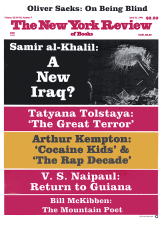I.
Tonight we are going to try a different dish
some worried savior brought us:
a vanilla-flavored tragedy
on how the market closed.
Waving from a window: that’s nice.
One hears the sheeted dead
braying in a box of pencils
by that curve in the creek,
and wonders how worse things can get.
Surely there are worse things
than reading, late at night, in bed.
I would like to write a victorian novel
of terror about a crossing-sweeper’s revenge
on life, somewhat in the vein of
Lady Audley’s Secret. They can can you for that
or for drawing smoke in puffs the way
it does come out of chimneys only forget
about it. The truth isn’t what’s wanted.
Penguin races are. Yes but you knew someone
who once knew a penguin. That doesn’t matter:
put it all in your book, what you were going
to say, and wake up with a shadow,
something less meaningful on the wall.
II.
Too bad the way children
on their way to school get mislaid
and the market closes.
The honeyed wind tears at your throat.
I thought you were a fair-weather friend
But I find you here now, in tears,
begging me to give up that stratagem
I’ve fought a lifetime to perfect,
and I’d rather do it—for you—than bask on
the rampart of some accomplishment: always
no work, no tears, and if children
play this way, then it’s all right.
I wasn’t mistaken
except in dreams.
Then, Nordic champions come
to tell you how you failed
by a hair,
a breath. And you go on,
believing them. And you go on believing them
for what silver
night incurs in the pockets
of all those waiting desperately for a sequel.
But it comes round
to this: what is comic is no longer
fatuous, and you’re the first to learn
about it and can keep silent about it
and make a killing. In the mean-
time your door is white as snow.
This Issue
April 11, 1991



